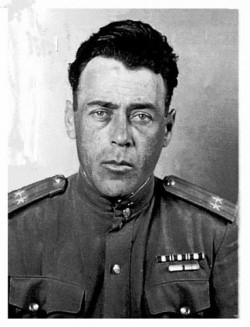
Aleksandr Leibovich
Aleksandr Leibovich was born in Starodub, now in western Russia, in 1910. His father was a blacksmith. When Aleksandr was only three years old, his adventurous father Osher took his elder son with him to America. Aleksandr remained in Starodub with his mother, who, when the boy turned eleven, sent him to be an apprentice at a metalwork artel (artisan cooperative).
Leibovich's biography was even more adventurous than his father's. The boy did not like this trade so he left the artel and learned to be a barber, working in that job for nine years, moving from town to town and city to city. Finally, he settled in Kerch, Crimea, where he joined a military club. After becoming a skilled marksman, he became an instructor of sport shooting at the local House of the Red Army.
Leibovich was drafted into the Red Navy in 1930. He graduated from a mine laying course and then one where he learned to repair weapons. Finally, he completed a military-technical marine school and then became a professional navy man. Despite his military technical education, Leibovich did not serve as a technician during the war. His first experience of war took place in the winter of 1939-40 during the Soviet-Finnish war, first as the commander of a grenade-gunner company. Later he commanded a company of a ski battalion of marines, then the ski battalion itself. Leibovich began his military service in the Soviet-German war also as commander of a ski battalion. He took part in the defense of Leningrad in 1941.
We do not know the details of his military service in 1942, but from January 1943 Major Leibovich was the commander of a special penal company of the Baltic Fleet – a unit of marines who had been found guilty of serious misconduct. The service of such penal units was very hard and their losses were extremely high. In 1943 and 1944 Leibovich and his company took part in dozens of battles south of Leningrad. In March 1944, after the lifting of the blockade of Leningrad in January of that year, Leibovich, as a lieutenant-colonel was transferred as the command of another penal unit (but one composed of soldiers with less serious infractions), the 487th Marine Disciplinary Battalion. With this battalion, Leibovich took part in 16 landing operations, many times participating in hand-to-hand fighting. He took part in the recapture of Tallinn, Estonia by the Red Army. In November 1944, Leibovich was mentioned in Stalin's order of the day that congratulated the Red Army on its liberation of the Baltics.
In April 1945, Leibovich took part in the landing assault on the Frische-Nehrung spit (East Prussia, now as the Vistula Spit divided between Poland and Russia). The landing was going on as hand-to-hand fighting – with daggers and rifle butts, because in the ensuing mesh, using of firearms was impossible His 487th disciplinary battalion was in the first wave of the assault, and most of the marines were killed; Leibovich himself was wounded, but continued to lead the operation.
In May 1945 the command of the Baltic Fleet presented Leibovich the title of Hero of the Soviet Union. The Supreme Commando rejected the proposal; instead, Leibovich received the fourth Order of Red Banner.
After the war, Leibovich continued his service with the Baltic Fleet.






